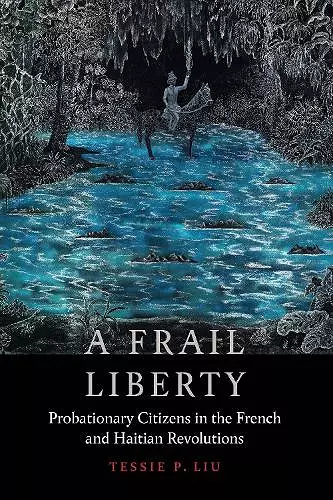A Frail Liberty
Probationary Citizens in the French and Haitian Revolutions
Format:Hardback
Publisher:University of Nebraska Press
Published:1st Jul '22
Currently unavailable, and unfortunately no date known when it will be back

A Frail Liberty traces the paradoxical actions of the first French abolitionist society, the SociÉtÉ des Amis des Noirs (Society of the Friends of Blacks), at the juncture of two unprecedented achievements of the revolutionary era: the extension of full rights of citizenship to qualifying free men of color in 1792 and the emancipation decree of 1794 that simultaneously declared the formerly enslaved to be citizens of France. This society helped form the revolution’s notion of color-blind equality yet did not protest the pro-slavery attack on the new citizens of France. Tessie P. Liu prioritizes the understanding of the elite insiders’ vision of equality as crucial to understanding this dualism.
By documenting the link between outright exclusion and political inclusion and emphasizing that a nation’s perceived qualifications for citizenship formulate a particular conception of racial equality, Liu argues that the treatment and status distinctions between free people of color and the formerly enslaved parallel the infamous divide between “active” and “passive” citizens. These two populations of colonial citizens with African ancestry then must be considered part of the normative operations of French citizenship at the time. Uniquely locating racial differentiation in the French and Haitian revolutions within the logic and structures of political representation, Liu deepens the conversation regarding race as a civic identity within democratic societies.
"In this provocative study, Tessie P. Liu raises important and uncomfortable questions about the nexus of race and citizenship during the French and Haitian Revolutions."-Lauren R. Clay, H-France Review "Richly documented and thoroughly researched, this volume will bring together seasoned scholars and students of French colonial history and postcolonial studies, as well as historians of the Atlantic world."-HÉlÈne B. Ducros, EuropeNow “This work is important for several reasons: It further complicates our understanding of republican citizenship in revolutionary France by focusing on colonialism, race, and merit. Second, in citing Michel-Rolph Trouillot, Tessie P. Liu highlights the role of the colonies in shaping metropolitan discourse. Third, she elevates the importance of the passive citizen to examine universality and merit. Liu also highlights the role that Amis des Noirs played in framing political debates, even if they were not often successful in their pursuits. Their credit is much deserved and well overdue.”-Erica Johnson Edwards, author of Philanthropy and Race in the Haitian Revolution “Tessie P. Liu brings new insights to two major events in French and world history, the French Revolution and the Haitian Revolution, and uses these histories to explore broader questions of democracy, political representation, and race. Moreover, Liu uses colonial history to illustrate and ultimately reshape how we see the history of metropolitan France. This is an outstanding work of scholarship: original, thought provoking, thoroughly researched, and well argued.”-Tyler Stovall, coeditor of The Black Populations of France: Histories from Metropole to Colony
ISBN: 9781496227294
Dimensions: unknown
Weight: unknown
458 pages